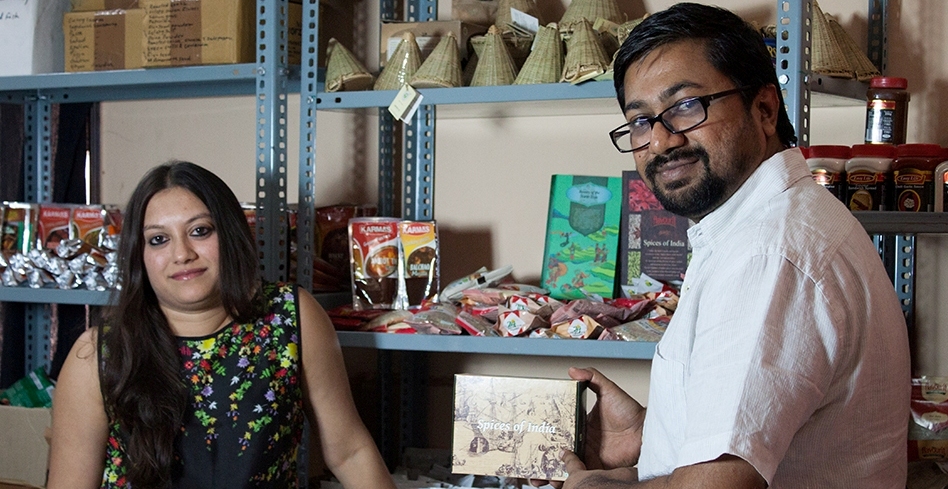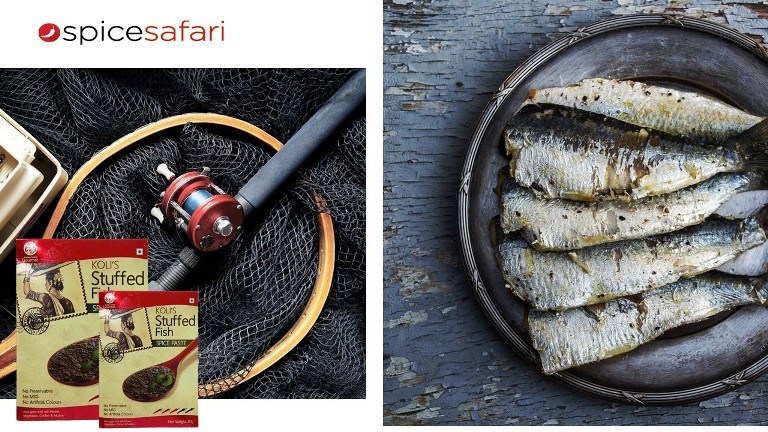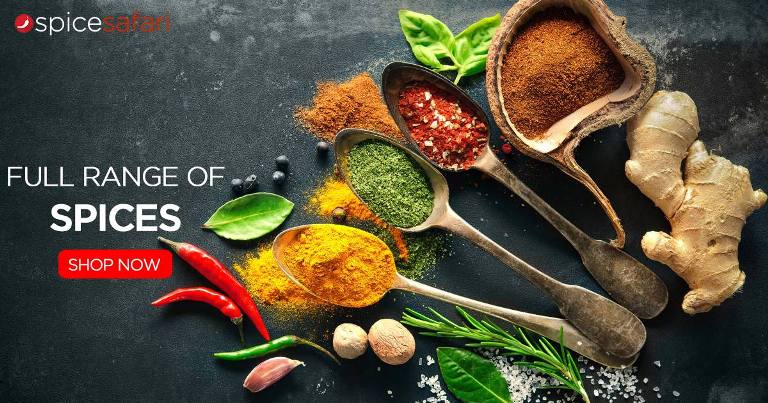
The husband-wife team of Tulsi Khemka and Nitesh Aggarwal.
Stepping out of the car, I hitched up my skirt and made a dash for the shop. It was raining hard in the sun and sand destination of Goa and I had a flight to catch. But I suddenly discovered I could sprint like Usain Bolt and fly like Sergey Bubka.
Why? It was a spice shop and inside was heaven. Racks and racks of those famed Goan spices and pastes – hot red Recheado to stuff into mackerel, sour Ambotik to smear on prawns, coconut milk-flavored Cafreal to enliven the chicken…
A few months down the line, I realize I could have spared myself the trouble.
There in my computer sits an online store with a collection of over 550 spices and seasonings from all over the world. Spicesafari is owned and managed by husband-wife duo Nitesh Agrawal and Tulsi Khemka, and co-founder Rahul Majithia.
The startup operates from a little office in Bangalore and delivers spices to over 200 countries.
“We address the problem of lack of choice and variety by sourcing unique products from different parts of the world, creating the spice experience through recipes, spice kits, combinations, and culinary tips,” Tulsi tells Tech in Asia

Photo credit: Spicesafari.
‘Different parts of the world’ means branded spices from the UK, the US, Africa, Thailand, Italy, Egypt, the Middle East, besides India, of course.
From Jamie Oliver’s Pesto Sauce to Al Fez’s Tahini Dressing to Kikkoman’s Teriyaki Marinade, you are likely to find well-known kitchen condiments in there. There’s something in it for organic food enthusiasts and tea lovers too.
The mistress of spices
Tulsi is a chartered accountant by training and used to work with Target Audit. She quit her job after she conceived as it was a high-risk pregnancy.
“I was freelancing post that, but wanted to do something new. I did some research on the spice industry, food patterns etc and realized that the problem I was facing – not getting all the ingredients and authentic spices – was true for others too. Most people would make do with alternatives, compromising on flavours or source them with great difficulty,” she says.
That’s true. Many of my friends prefer to buy whole spices like turmeric, coriander, fenugreek, and pepper and grind them at home because readymade powdered packs from local stores can be completely tasteless.

Photo credit: Spicesafari.
I buy saffron once a year from a Kashmiri trader at an artisans’ bazaar run by Dastkar in Delhi. Oregano and parsley come from the shops of Kilmora, a rural organization based in the hills of Uttarakhand. I grow lemongrass and basil at home.
Anyone who likes to cook or loves to eat knows the importance of sourcing the ingredients right.
Food loving couple Tulsi and Nitesh thus rustled up Spicesafari. Their beta website was launched last year, and during this phase they did about 500 orders. The new website was launched about three months back.
A fistful of flavor
“We pick small quantities to ensure products are fresh and recent when sent to the customer. The quantity we stock depends on the shelf life of the product, sales experienced during the beta launch, lead time in procuring the product, storage challenges, and perceived demand,” says Tulsi.
The office in Bangalore also doubles up as a warehouse. The products are stored keeping in mind sunlight exposure, moisture, and so on. “We also ensure quality by ensuring that all necessary government certifications are met by the brands, the quality of packing, and general customer reviews.”

While Spicesafari receives a commission on sales, customers get to buy at maximum retail price – which is the the price mentioned on every product pack and above which retailers are not allowed to charge in India.
Tulsi says the buyers are mostly in their late-20s to mid-50s.The startup delivers in three to five days within India, while an express delivery abroad takes a week.
You may be surprised, but it has customers from India’s tier two cities too. “Generally shoppers from tier two cities order more international brands and spices in comparison to those from tier one cities.”
International orders are, of course, for Indian spices (which include the Goan Recheado and Balchao pastes that I worked so hard to get on a rainy day!).
Recipes and bloggers
Procuring unique, good quality spices is a challenge, says Tulsi. “We constantly look for brands which source and process unique and different spices.”
There are other challenges too – like product expiry in case of no sale, sale towards the end of the expiry period, and government clearances for importing products.
But how do they hope to carve a niche when players like Amazon and Godrej Nature’s Basket are selling branded spices? Even those selling organic farm produce are online these days and stock a fair amount of spices.
Spicesafari does have a spicy little plan to make it to your heart through the stomach: it is working with food bloggers and sending recipes your way. Bigbasket, one of India’s leading online grocers, recently started sending meal plans and recipes along with links to where you can buy the ingredients.
“We are working on a standalone recipe section, in addition to what is already available under each product. The inputs will come from bloggers, in-house teams, and brands,” says Tulsi.

Photo credit: Seoulfully.
The bloggers will be paid a commission for each post that converts into a sale. “We have made the process of listing and on-boarding very easy, with an open API, which allows bloggers to come and register and go live immediately.”
It is co-founder Rahul who handles tech while Nitesh helps with funds and business strategy. The rest is managed by Tulsi.
“During the initial days of Spicesafari, when we sat late, I would have my son in office. Even today it’s the same. But the passion of creating something big, the passion for food, and the love for spices ensure that we find ways to balance the little one and work,” she says.
This post From Goan Recheado to Moroccan Tahini, this husband-wife team brings you the world on a platter appeared first on Tech in Asia.
from Tech in Asia https://www.techinasia.com/spicesafari-sells-branded-spices-online
via IFTTT
No comments:
Post a Comment